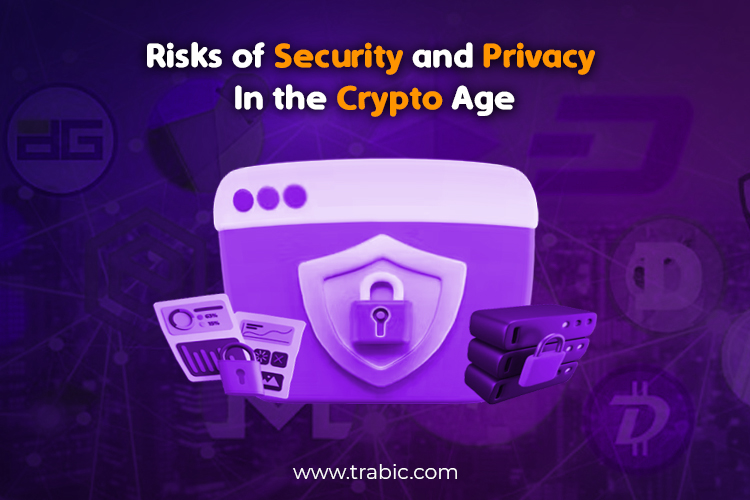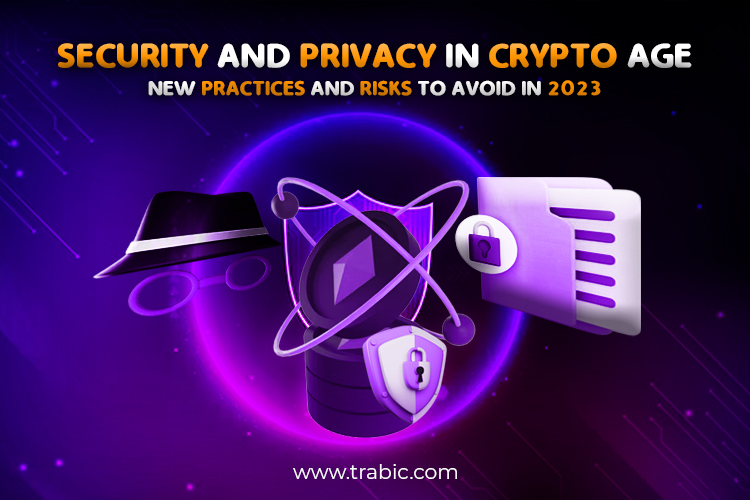In the age of cryptocurrency, people have high expectations of security and privacy. People have high expectations of security and privacy in the age of cryptocurrency due to the significant value of cryptocurrencies, their decentralized nature, previous security breaches, increasing government regulations, and the desire for anonymity. As such, cryptocurrency companies must meet these expectations to gain the trust and confidence of their customers. Cryptocurrencies have become increasingly valuable, with some even surpassing the value of traditional assets like gold.
As such, people have high expectations of security and privacy to protect their significant investments. Cryptocurrencies operate in a decentralized environment, which indicates that there is no authority governing the currency. As a result, people expect high security and privacy to ensure that their funds are safe from theft or loss. There have been numerous high-profile security breaches in the cryptocurrency industry, which have resulted in significant losses for investors. As a result, people are now more aware of the importance of security and privacy and have higher expectations from cryptocurrency companies.
Governments worldwide are introducing regulations to protect investors and prevent money laundering. As a result, people expect that cryptocurrency companies will comply with these regulations and provide a high level of security and privacy to protect their investments. Many people are attracted to cryptocurrency because of its potential for anonymity. They expect high privacy to ensure their financial transactions remain private and confidential.
Blockchain Technology Security

Blockchain technology maintains a high level of security due to its decentralized and immutable nature. Blockchain technology provides a high level of security due to its decentralized nature, immutable record-keeping, consensus mechanism, cryptographic hashing, and public-key cryptography. These features make it very difficult for hackers to attack the system, ensuring the blockchain remains secure and trustworthy. Blockchain technology operates in a decentralized environment, meaning no central authority controls the system.
This slightly decreases the risk of a single point of loss, making it more challenging for hackers to attack the system. Once a transaction is kept on the blockchain, it cannot be changed or deleted. This forms an immutable record of all transactions, making it difficult for fraudulent activity to go undetected. Blockchain technology uses a consensus mechanism, such as Proof of Work (PoW) or Proof of Stake (PoS), to verify transactions and validate new blocks on the chain. This ensures that all transactions are validated by multiple parties, reducing the risk of fraud.
Blockchain technology uses cryptographic hashing to secure data on the blockchain. Each block on the chain contains a previous block’s hash, making it nearly impossible for hackers to alter the data without detection. Blockchain technology uses public-key cryptography to secure transactions. Each user has a public key and a private key. The public key is utilized to encrypt the transaction, while the private key is utilized to decrypt it. This completely ensures that only the intended recipient can access the transaction.
Risks of Security and Privacy in the Age of Cryptocurrency

There are several risks to security and privacy in the Age of Cryptocurrency that individuals and organizations need to be aware of. To mitigate these risks, follow best practices for security and privacy when using cryptocurrency, such as utilizing strong passwords and two-factor authentication, maintaining your software updated, using reputable exchanges and wallets, and being cautious of phishing scams.
Additionally, it is vital to keep up-to-date on the latest developments and potential risks in the cryptocurrency industry and to seek professional advice if you need clarification on any aspect of investing or trading in cryptocurrencies. Here are some of the main risks:
- Hacks and cyberattacks: Cryptocurrency exchanges, wallets, and other platforms can be vulnerable to cyberattacks and hacks, resulting in the theft of cryptocurrency holdings.
- Phishing scams: Phishing scams are becoming increasingly sophisticated and can trick individuals into giving away their private keys or other sensitive information.
- Lack of regulation: Cryptocurrency is still largely unregulated, which can make it easier for fraudsters to operate and can make it more difficult for individuals to seek legal recourse in the event of a loss.
- Volatility: Cryptocurrency values can be highly volatile, resulting in significant financial losses for individuals who hold these assets.
- Privacy concerns: While privacy-focused cryptocurrencies can benefit user privacy, there are concerns that they could be utilized for illegal activities like money laundering and terrorism financing.
- Human error: Individuals can make mistakes when using cryptocurrency platforms, such as sending funds to the wrong address or falling victim to a phishing scam.
Best Practices Of Security And Privacy In The Age Of Cryptocurrency

Some best practices can help you protect your assets and ensure the privacy of your transactions in the Age of Cryptocurrency. Here are some best practices for security and privacy in the Age of Cryptocurrency:
Use A Reputable Cryptocurrency Exchange:
Using a reputable cryptocurrency exchange is a crucial best practice for security and privacy in the Age of Cryptocurrency. A reputable exchange will have robust security measures to protect your assets and personal information from hacking incidents and theft. Look for online reviews and feedback from other users to assess the exchange’s reputation and track record. Check if the exchange has been involved in hacking or security breaches.
A reputable exchange should comply with relevant regulations and laws, such as Know Your Customer (KYC) and Anti-Money Laundering (AML) requirements. Look for exchanges that are registered with regulatory bodies in their respective countries.
A reputable exchange will have a responsive and helpful customer support team to assist you with any issues or concerns. Choose an exchange with high trading volume and liquidity, which ensures you can easily buy and sell your cryptocurrency at fair prices. Look for exchanges with well-known and reputable companies back, which indicates a higher level of trustworthiness.
Using a reputable cryptocurrency exchange is a best practice for security and privacy in the Age of Cryptocurrency. Be sure to research the exchange’s reputation, compliance, customer support, liquidity, and the companies behind it before using it to trade or store your cryptocurrency.
Use Strong Passwords And Two-Factor Authentication:
Using strong passwords and two-factor authentication (2FA) is a best practice for security and privacy in the Age of Cryptocurrency. Be sure to use a unique and complex password, consider using a password manager, enable 2FA, use an authenticator app, and back up your 2FA codes to ensure the highest level of security for your cryptocurrency accounts.
Create a strong password unique to your cryptocurrency account and contains a mix of uppercase and lowercase letters, numbers, and special characters. Avoid using easily guessable passwords, such as common phrases or personal information. Consider using a password manager to create and store strong passwords securely. Password managers can also generate unique passwords and automatically fill them in when you log in to your accounts.
2FA places an additional layer of security to your cryptocurrency accounts by requiring you to enter a one-time code developed by an app or sent via SMS to your phone in addition to your password. This ensures that even if someone else has your password, they cannot access your account without the one-time code.
Consider using an authenticator app such as Google Authenticator, Authy, or Microsoft Authenticator to generate one-time codes for your 2FA. Authenticator apps are generally more secure than receiving 2FA codes via SMS. If you use an authenticator app for 2FA, back up your codes if you lose or replace your phone. Many authenticator apps have built-in backup options or allow you to copy the codes to a secure location manually.
Use A Hardware Wallet:
Using a hardware wallet is a best practice for security and privacy in the Age of Cryptocurrency. Be sure to choose a reputable hardware wallet, set it up securely, keep it offline, only use official software, and back up your hardware wallet seed phrase to ensure the highest level of security for your cryptocurrency holdings. This physical device keeps your cryptocurrency offline, providing high security against hacking and theft.
Research different hardware wallet options and choose a reputable one that has been thoroughly tested and has good reviews from other users. Track the manufacturer’s instructions to establish your hardware wallet securely.
This typically involves creating a strong passphrase and storing it securely. Keep your hardware wallet disconnected from the internet when you are not using it. This helps to protect it against hacking attempts and other security threats. Only use the manufacturer’s official software to interact with your hardware wallet. Using third-party software could put your cryptocurrency at risk of theft or loss. Make sure to back up your hardware wallet seed phrase and store it in a secure location. This ensures you can access your cryptocurrency if your hardware wallet is lost or damaged.
Keep Your Software Updated:
Keeping your software updated is a best practice for security and privacy in the Age of Cryptocurrency. Be sure to enable automatic updates or check for updates regularly, update your operating system, be cautious of fake updates, and keep backups of your data to ensure the highest level of security for your cryptocurrency holdings. Most cryptocurrency wallets and exchanges have the option to enable automatic updates.
This ensures that you are always running the latest version of the software, which includes important security fixes and feature enhancements. Check for updates regularly if your cryptocurrency wallet or exchange has no automatic update option.
Visit the official website or app store to see if a new version is available. Keeping your operating system up-to-date with the latest security patches and updates is also essential. This helps to protect your device against vulnerabilities that hackers could exploit. Hackers may trick you into downloading fake updates containing malware or other malicious software.
Always verify the authenticity of updates by downloading them from official sources and checking the digital signatures. Before installing any software updates, it is a good idea to back up your cryptocurrency data. This ensures you can restore your holdings if something goes wrong during the update process.
Be Wary Of Phishing Scams:
Being wary of phishing scams is a best practice for security and privacy in the Age of Cryptocurrency. Ensure to review the sender’s email address, avoid clicking on links or downloading attachments, verify the request’s legitimacy, use two-factor authentication, and educate yourself on the latest phishing scams and tactics to guarantee the highest level of security for your cryptocurrency holdings. Phishing is a cyber-attack where attackers attempt to fool you into giving them sensitive information, such as your cryptocurrency wallet login credentials, by posing as a legitimate entity.
Scammers frequently operate email addresses that look similar to legitimate ones, so check the sender’s email address carefully. Legitimate companies and organizations usually use their official domain names in their email addresses. Be wary if you receive an unsolicited email inviting you to click on a link or download an attachment.
These could be malicious links or files that install malware on your device or steal your cryptocurrency wallet login credentials. If you receive an email or message asking for sensitive information, such as your cryptocurrency wallet login credentials, verify the request’s legitimacy by contacting the company or organization directly.
Only provide sensitive information once you verify that the request is legitimate. Use two-factor authentication on your cryptocurrency wallet to add an extra layer of security. This helps ensure that even if attackers obtain your login credentials, they cannot access your wallet without access to your second authentication factor. By reading news articles and security alerts, Stay Updated and be aware of the trending phishing scams and tactics. The more you know about these attacks, the better you will recognize and avoid them.
Keep Your Private Keys Secure:
Keeping your private keys secure is a best practice for security and privacy in the Age of Cryptocurrency. Use a hardware wallet, use a strong password and enable 2FA, back up your private keys, and be cautious of phishing scams to ensure the highest level of security for your cryptocurrency holdings.
Private keys are the secret codes that allow you to access your cryptocurrency holdings, and if they fall into the wrong hands, your funds could be stolen. This physical device holds your private keys offline, away from potential online threats. This is considered the most secure way to store your private keys. If you use a software wallet or exchange that requires a password, choose a robust and unique password.
Refrain from using the same password for numerous accounts, and consider utilizing a password manager to keep track of your passwords. Use two-factor authentication (2FA) on your cryptocurrency wallet or exchange to add an extra layer of security. This completely ensures that even if someone acquires your password, they will not be able to access your account without having access to your second authentication factor.
Please back up your private keys and store them securely, such as in a safe or a safety deposit box. This ensures you can still access your cryptocurrency holdings if your device is lost or stolen. Phishing scams can trick you into giving away your private keys. Always verify the legitimacy of requests for your private keys, and never share them with anyone.
The importance of keeping your private keys secure cannot be overstated. Private keys serve as the gatekeepers to one’s digital assets, allowing individuals to send, receive, and manage their cryptocurrency holdings. As such, security and privacy expectations are at an all-time high. Failure to safeguard these critical codes can lead to irreparable losses, leaving individuals vulnerable to cyber-attacks and digital theft.
It is incumbent upon cryptocurrency investors to exercise the utmost care in managing their private keys, utilizing secure storage solutions such as hardware wallets or cold storage, and implementing multi-factor authentication protocols to prevent unauthorized access. The evolving landscape of digital finance requires vigilance and diligence, and a commitment to upholding the principles of security and privacy is paramount.
Use privacy-focused cryptocurrencies
When using privacy-focused cryptocurrencies, it is important to follow other best practices for security and privacy, such as using strong passwords and two-factor authentication, keeping your software updated, and being cautious of phishing scams. Additionally, it is essential to note that while these cryptocurrencies prioritize user privacy, they are not entirely anonymous, and it is still possible for transactions to be traced back to users in certain circumstances.
These cryptocurrencies prioritize user privacy and anonymity, which can be especially important in a digital world where personal information is often vulnerable to hacks and data breaches. Here are some privacy-focused cryptocurrencies you may want to consider:
- Monero (XMR): This cryptocurrency utilizes ring signatures, stealth addresses, and confidential transactions to protect user privacy.
- Zcash (ZEC): Zcash is a privacy-focused cryptocurrency with zero-knowledge proof called zk-SNARKs to keep transactions private.
- Dash (DASH): Dash is a cryptocurrency that offers an optional privacy feature called PrivateSend. This feature uses a mixing process to make transactions more difficult to trace.
- Verge (XVG): Verge is a privacy-focused cryptocurrency combining Tor and I2P to keep user identities private.
- Grin (GRIN): This privacy-focused cryptocurrency uses a technology called Mimblewimble to enable private transactions.
